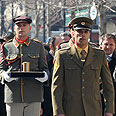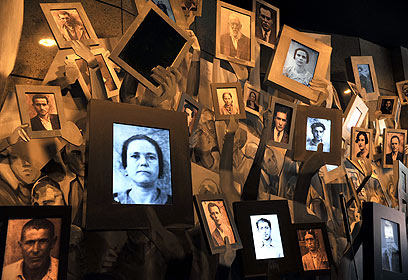
Macedonia opens Shoah memorial center
Inauguration ceremony marked by symbolical placing of three urns with ashes of Macedonian Jews killed in Treblinka concentration camp in Poland, 7,148 of them lost their lives
The inauguration ceremony was marked by symbolical placing of three urns with ashes of Macedonian Jews killed in the Treblinka concentration camp in Poland, where 7,148 of them lost their lives after being deported there in 1943.
The urns were carried by Macedonian soldiers who marched through the centre of Skopje followed by several hundred people.
"The lessons of the Holocaust in your country must serve as an early warning system to those of your neighbours, where anti-Semitism and Holocaust denial are resurgent," Shimon Samuel of the Simon Wiesenthal Center said at the ceremony.
The memorial center, built in an area once populated by the Jewish community, was inaugurated in the presence of Macedonian President George Ivanov, Israeli Vice Prime Minister Moshe Ya'alon and officials and diplomats from neighbouring countries, including the presidents of Albania and Montenegro.

Portraits of Macedonian Jews killed in Nazi-death camps (Photo: AP)
At the ceremony, Macedonia was hailed for enabling the Jews to regain the assets they had lost in the Shoah.
In his speech, the World Jewish Congress' Research Director Dr. Laurence Weinbaum pointed out that no Jewish community in Europe had suffered a greater degree of destruction than the Macedonian one.
Referring to Macedonia's principled stand on the restitution issue and to its unwavering friendship with Jews and Israel, he said: "In much of contemporary Europe, dead Jews are respected, but live ones are defamed. You honor the dead and the living, and in so doing you have set an example to which other nations could and should aspire.
"There are nations that are larger, richer, better known and more powerful than Macedonia, but none more decent, gracious, good-hearted and
noble."
Macedonian Jewry benefited from a 2002 law providing for the return of heirless Jewish property, a law that is widely recognized as one of the best in Europe.
President: Support for Israel to continue
The cornerstone for the museum was laid in 2005. Ljiljana Mizrahi, president of the local Holocaust Fund that had initiated the project, opened the ceremony by reading the names of some of the victims and explained that the museum would "preserve the memory of the Jews of Macedonia, not only commemorate their deaths, but also their lives and the civilization that perished with them."
In his address, Macedonian President Ivanov recalled the long history of co-habitation between Jews and Macedonians of other faiths and said that with the loss of the Jews "a part of Macedonia had been torn out and that on the Jewish streets of Skopje, Bitola and Stip, after the war there was silence."
He went on to note Macedonia's support for Israel, which he said would continue.
Minister Ya'alon said 98% of Macedonia's Jewish population – more than 7,000 people – died in the camps.
"The only surviving member of the 81-strong Misrahi family was my father," Viktor Misrahi, one of the rare survivors, told AFP.
"Today, the ashes of our people were brought back here from Treblinka and they will remain here, at their home," he added.
Only an estimated 200 Jews live in Macedonia today, most of them in the capital Skopje.
Built in Skopje's former Jewish quarter, the Holocaust Memorial Center will incorporate a museum, an arts center and a hotel.
The Associated Press contributed to this report
- Follow Ynetnews on Facebook










